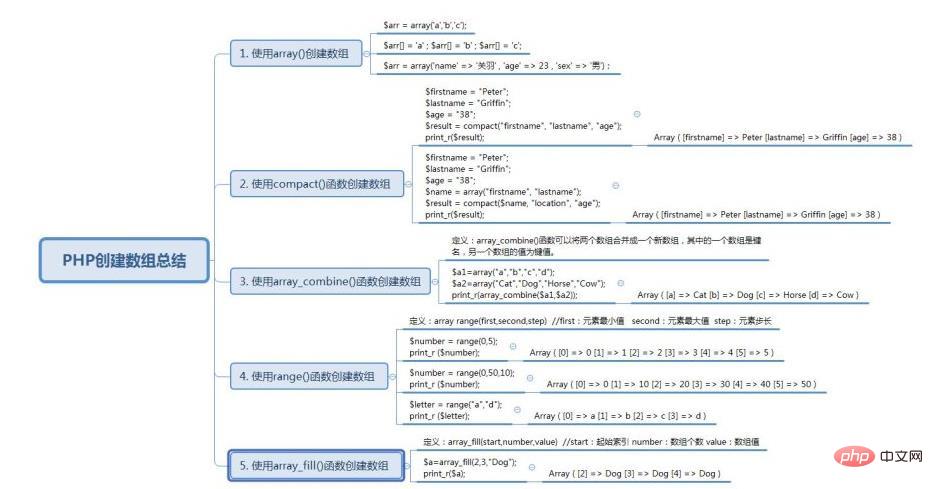
There are 5 ways to define arrays in php, namely: 1. Use array to create an array; 2. Use "$arr[] = 'a';" to create an array; 3. Use "array(1= >'jack',2=>'lucy',500=>'hcoder')" to create an array; 4. Use "$arr[1] = 'jack';" to create an array; 5. Use " Create an array using $arr['name'] = '';".

The operating environment of this tutorial: Windows 10 system, PHP version 8.1, DELL G3 computer
How many ways to define an array in PHP?
5 ways to create arrays in PHP
In PHP and other programming language programming, the creation of arrays is often used in front-end development. , JS array creation can be directly created and assigned by [] and new Array(). But what are the ways to create arrays in PHP? After reviewing the information and collecting and sorting it online, I summarized it:

$arr = array('a','b','c'); $arr[] = 'a' ; $arr[] = 'b' ; $arr[] = 'c'; $arr = array('name' => '关羽' , 'age' => 23 , 'sex' => '男');
$number = range(0,5);
print_r ($number);
//打印:Array ( [0] => 0 [1] => 1 [2] => 2 [3] => 3 [4] => 4 [5] => 5 )
$number = range(0,50,10);
print_r ($number);
//打印:Array ( [0] => 0 [1] => 10 [2] => 20 [3] => 30 [4] => 40 [5] => 50 )
$letter = range("a","d");
print_r ($letter);
//打印:Array ( [0] => a [1] => b [2] => c [3] => d )$firstname = "Peter";
$lastname = "Griffin";
$age = "38";
$result = compact("firstname", "lastname", "age");
print_r($result);
//打印: Array ( [firstname] => Peter [lastname] => Griffin [age] => 38 )
$firstname = "Peter";
$lastname = "Griffin";
$age = "38";
$name = array("firstname", "lastname");
$result = compact($name, "location", "age");
print_r($result);
//打印:Array ( [firstname] => Peter [lastname] => Griffin [age] => 38 )
//由于$location变量不存在,所以存入不了数组$a1=array("a","b","c","d");
$a2=array("Cat","Dog","Horse","Cow");
print_r(array_combine($a1,$a2));
//打印:Array ( [a] => Cat [b] => Dog [c] => Horse [d] => Cow )$a=array_fill(2,3,"Dog"); print_r($a); //打印:Array ( [2] => Dog [3] => Dog [4] => Dog )
First format
$Array name = array('value' , 'value', 'value',...);This format does not specify the key of the element in the array. PHP will automatically create the key in the form of a number, starting from 0 and accumulating in sequence. Format of calling array: $array name[numeric key]<?php $arr = array('a','b','c'); echo $arr[1]; //输出
Second format
$array name[] = 'value ';$array name[] = 'value';$array name[] = 'value';......This kind The format also does not specify the keys of the elements in the array. PHP will automatically create the keys in the form of numbers, starting from 0 and accumulating sequentially. Format of calling array: $array name[numeric key];<?php $arr[] = 'a'; $arr[] = 'b'; $arr[] = 'c'; echo $arr[1]; //输出b
The third format
$数组名称 = array(数字类型的键=> ‘值’, 数字类型的键 => ‘值’, 数字类型的键=> ‘值’,……);
<?php $arr = array(1=>'jack',2=>'lucy',500=>'hcoder'); echo $arr[500]; //输出hcoder
The 4th format
$Array name[integer type key] = 'value';$Array name [Integer type key] = 'value';$Array name[Integer type key] = 'Value';......Calling format: $Array name[ Integer type key];<?php $arr[1] = 'jack'; $arr[2] = 'lucy'; $arr[500] = 'hcoder'; echo $arr[500]; //输出hcoder
$数组名称=array(‘字符串形式的键’=>’值’,‘字符串形式的键’=>’值’,……);
<?php $arr = array('name'=>'张三', 'age'=>18); echo $arr['age']; //输出18
The 6th format (associative array)
$Array name['Key in string form']=>'Value';$Array Name['Key in string form']=>'Value';
......
<?php $arr['name'] = '张三'; $arr['age'] = 18; echo $arr['age']; //输出18
PHP Video Tutorial"
The above is the detailed content of There are several ways to define arrays in php. For more information, please follow other related articles on the PHP Chinese website!




